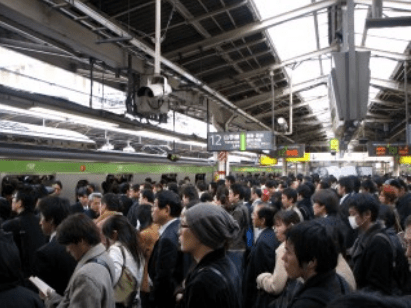Squashed with a stranger: The daily commute in a Tokyo train car.
Imagine being so densely packed into a train car that you can’t even move your arms to pull your phone out of your pocket. This is the everyday reality of the millions of people who commute by train in the Tokyo area. When one imagines visiting Japan, it is unlikely that the first experience that comes to mind is riding a train. But if you are living in the Tokyo area, it is likely an integral part of your everyday experience. For me, it is also a window into a culture and mindset that is very different from my own American culture.
As a student living on the western edge of Chiba prefecture, but attending a university in Central Tokyo, my day is almost always bookended by an hour-long commute to and from classes. At 8am, I board one of many Tokyo inbound trains, and as a classmate once said, I “join the human brick”. To say that the trains are crowded during rush hour feels like an understatement. On a good morning, I’m surrounded by people but with enough room to open my kanji textbook and review the latest chapter. On a bad morning, I am making full body contact with 5 different people at the same time, and can’t stand with my feet directly under me, much less read a book. If you think this sounds like a miserable experience, you’d be wrong. It’s actually fine.
Many people who ride a Tokyo train for the first time will comment on the same thing: despite the immense number of people, the train car is silent. Except for the occasional cough or sniffle, no one makes a sound during rush hour. It’s a golden rule, so respected that it’s one of the first things a Japanese person might mention as advice to follow while visiting Japan, at least in my experience. Additionally, people move as minimally as possible so as not to bump the other people around them. The result is a very odd sense of respect, maybe even privacy, in the packed train. Of course there are exceptions, but generally speaking, the everyday commute is tolerable. Aer a minute or two, I adjust to the feeling of a bunch of other un-intrusive bodies around me, and retreat into my own little mental world for an hour. I oen explain the odd experience of riding the train everyday as a contrast between physical personal space, and mental personal space: Physically speaking, I have never been so close to so many people in my entire life. However, because everyone on the train makes their presence as small as possible, my mental space, isn’t overwhelmed like it would be in a similar situation in the US. This ethos pervades life outside the train as well. Crowds move efficiently with minimal collisions; busy restaurants are quiet enough that you can hold a conversation in a low voice; people wait patiently in line to get on escalators and into elevators rather than pushing or shoving; the list goes on. This highly visible and intense respect for others’ space is, in my experience, a distinctly Japanese phenomenon that I have never encountered elsewhere. But it is really in the rush-hour trains that this respect shines.
While I do not necessarily look forward to riding the train, it is oen the two times a day that I take to clear my head. Because of the complexity of the train system in Tokyo, my first couple of commutes were stressful. But upon becoming familiar with my commuting path and the various lines along the way, my two hours of commuting have become an important time to do something very rare in the modern world: nothing. When they train isn’t very crowded, I study from my small textbooks, or browse the internet on my phone. But when the train is at full capacity, I physically can’t do either of those things comfortably because some person’s backpack is in my face (at five feet two inches, this situation is pretty common). Instead, I am forced to do nothing at all. I take this time on the crowded train to think of new blog post ideas, reflect on recent adventures, daydream, or even just zone out completely.
On average, I spend about 12 to 14 hours a week commuting. This ritual of rush hour Tokyo train riding has become such an integral part of my daily experience that I can confidently say it is one of the most impactful things I’ve experienced in Tokyo. Without this experience I don’t think I’d have as good an idea of the Japanese sense of space and respect for others. It is unique to living in urban Japan, and probably couldn’t be replicated anywhere else. It’s an experience that words can only vaguely capture, and will be something I always remember and might even miss when I return home. As strange as it sounds, when asked about my time studying abroad, the nightmarishly packed Joban Line train at 8am might be one of the first things I mention.
Related Posts

EAT, DRINK, EXPLORE: TOKYO
BEST FOOD TO EAT IN TOKYO Since the 17th century, soba (buckwheat) noodles have been a staple in the Japanese diet. These tasty noodles are as thick as spaghetti and... keep reading

Top 10 Japanese Slang Words & Phrases You Must Know
Textbook Japanese is great and all, but if you really want to impress the locals, you need to know Japanese slang terms. These aren’t the phrases you’ll learn in class... keep reading

The 13 Best Gifts for a Study Abroad Student in 2024
Are you looking for the best gifts to give someone traveling abroad? Perhaps you need to find some study abroad gifts for a student planning to study overseas. You've come... keep reading
